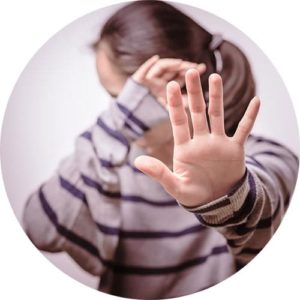A child that’s being abused doesn’t stop loving its parents, it stops loving itself.
As young people come into the Claudia Black Young Adult Center with addictions, mental health and trauma issues we often find that beneath those are the scars of physical abuse. While physical abuse is thought of as something that occurs outside of one’s family, in reality, more people are subject to trauma within their own families than in the world beyond. It is estimated that one out of every six families experiences domestic violence; violence perpetrated towards one of the other adults (in a two-parent family) and/or some combination of violence towards the children. The Center for Disease Control estimates that one in every fifteen children is exposed to physical abuse within their home. The possibility of physical abuse within the family substantially increases if the family is affected by substance addictions.

Obviously, the ultimate act of physical abuse is when someone is killed, but for many family members the abuse is hitting, shoving, pinching, slamming someone up against the wall, or a terrorizing car ride. Sadly, this is rarely a one-time incident; it is most commonly an ongoing pattern in the home. When physical abuse occurs within a family, it becomes so common it becomes normalized, ultimately minimized and denied. Family members lose the ability to recognize it for what it is—abusive and traumatizing—and learn to tolerate the intolerable. Consequently, the pain is frequently acted out in addictions, depression, and other forms of self-harm.
Just as traumatizing, and, in fact, for some even more so, is to witness the abuse of family members. The trauma of the “witness factor” is the experience of helplessness and fear when witnessing something that is emotionally overpowering.
The following story aptly describes the witness factor within a family. The young man that describes this experience came to the Claudia Black Young Adult Center for substance use disorder and rageful behavior resulting in criminal charges. When I was about ten, dad would get home drunk about three in the morning and drag my brother out of bed. He would beat him with his fists yelling at him to man up. Then dad would hold him up to the mirror, by then my brother was crying, sniveling, snot running down his nose, sometimes even bleeding, and my dad would ask, “Is this what a man looks like?” The tears and fears that filled my brother’s eyes were my tears and fears. I always wondered when dad would try to make me a man.
Not all family members who experience these traumas have enough pain to generate post-traumatic stress, however, witnessing family violence, particularly if repetitive and seen at an early age, can most certainly produce trauma-related disorders. These young adults come to treatment, often as a result of their depression, and sometimes repeating the behaviors they so abhorred. Very likely they are using alcohol and other drugs to medicate their pain, operating from the shame-based belief that who they are is not okay, that they are defective, damaged, or no good.
At the Claudia Black Young Adult Center, we address patients’ addictions, depression, and anxiety, but central to the treatment is addressing the scars of internalized shame. We also help these young adults recognize that they did not deserve the trauma they were subject to.

